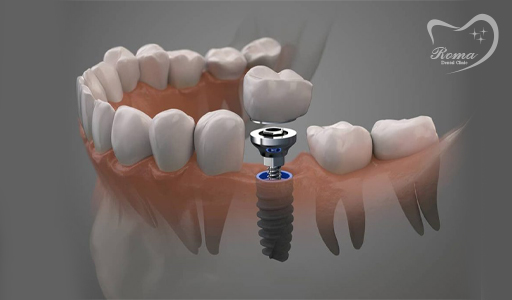Dental implants

There are various factors such as aging, tooth extraction, tooth breakage, etc., which cause tooth loss. Emptying teeth can have a huge impact on reducing the beauty of a person’s smile. For this reason, many people are looking for a permanent way to replace missing teeth. Dental implants are one of the most popular and effective methods to fill the place of extracted teeth. Which today is a very good alternative to artificial teeth (removable dentures). For this reason, we want to fully acquaint you with the advantages and disadvantages of dental implants.
What is a dental implant?
The implant consists of two parts, the first part is a metal screw (fixture) that is placed in the gums instead of the root of the tooth and an artificial tooth (abutment or crown) is placed on it. Which looks exactly like natural and real teeth. With the difference that it is permanent and does not break or rot. The fixtures are usually made of titanium and are perfectly compatible with the jawbone. However, due to the relatively high cost of this cosmetic dental procedure, some people are not able to have implants.
Benefits of Dental Implants
Despite the relatively high cost of the implant, its tremendous benefits have led many people to want to use it to fill in the gaps in their lost teeth. The most important advantages of implants are the following:
- One of the most basic benefits of permanent dental implants is to enhance the beauty of your teeth, which can help you have a more beautiful smile.
- High speed implantation of permanent teeth is another advantage of implants. Which replaces the missing tooth in the shortest possible time without any disturbance in the health of the jaw and gingival bones.
- Maintaining oral health and teeth, preventing body odor and preventing lateral tooth decay are other benefits of dental implants.
- The implants are completely fixed and do not break or break.
- One of the most important and attractive advantages of implants is their long life. Which has made them popular among dentists and patients.
Disadvantages of dental implants
If dental implants are performed by non-specialist doctors, they may have complications and risks, the most important of which are the following:
- Infection of the fixture
- Jaw and mouth nerve damage due to improper injection of anesthesia
- Injury of lateral teeth
- Sinus problems in implanting maxillary teeth
On the other hand, not all people are able to have dental implants. Therefore, if you have the following conditions, you can not use implants.
- In case of infectious diseases of the mouth and teeth
- If you have diabetes, your diabetes must be controlled before you can use an implant.
- If you use tobacco, it is better to stop smoking first and then apply for an implant.
- If you are taking anticoagulants or blood thinners.
- If you have used radiotherapy.
- If you are pregnant.
Post-implant care
To prevent implant complications and post-treatment problems, it is best to take post-implant care recommendations seriously. The most important points that should be considered after treatment, the following can be mentioned.
- Rinse your mouth and teeth seriously for at least 8 hours after implantation.
- Brushing should be avoided for up to 24 hours after treatment.
- Do not drink fluids with a straw for at least two weeks.
- After the implant, special floss and toothbrush should be used.
- Avoid smoking, drinking coffee and tea for at least three days after treatment.
- Smoking and alcohol consumption can increase the risk of implant complications.
- Avoid eating and drinking liquids and hot foods.


